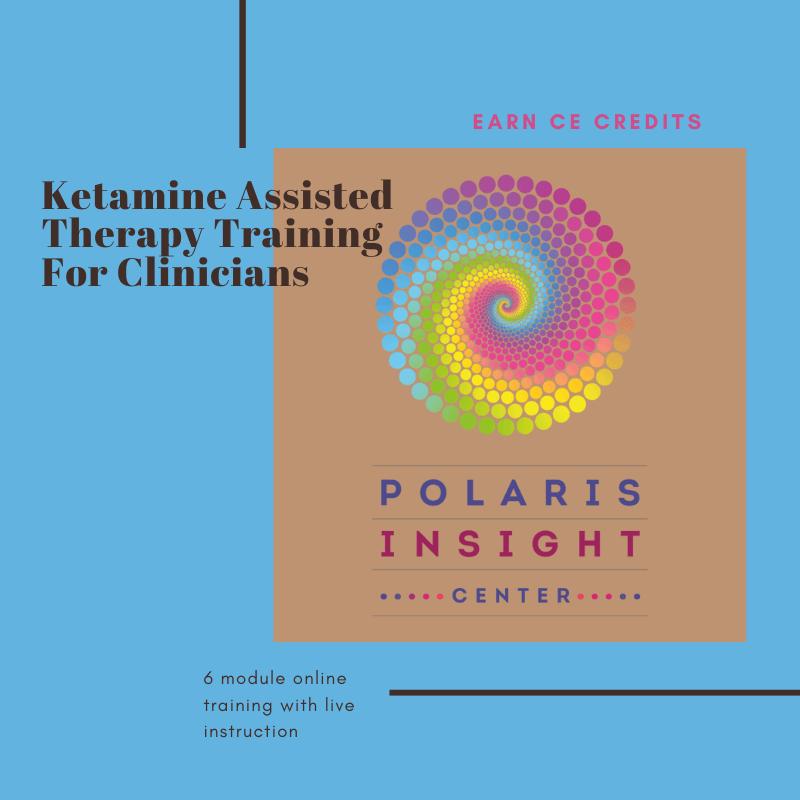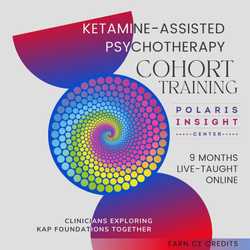Ketamine-Assisted Therapy Training for Clinicians

Ketamine-Assisted Therapy Training for Clinicians
$0.00
Training Description
Learn the principles and procedures of Ketamine Assisted Therapy in this six module training with the Polaris Insight Center. You will acquire the skills necessary to administer ketamine in combination with psychotherapy in a clinical setting. The curriculum is taught by an experienced and knowledgeable faculty of ketamine and MDMA protocols through live video sessions. The format is interactive between trainers and students. This training program is designed for mental health professionals - physicians, psychologists, therapists, nurses, social workers, etc.
Polaris Insight Center is dedicated to the ethical and compassionate clinical use of ketamine-assisted and psychedelic-assisted, psychotherapy. We share a deep interest in, and a broad range of experience working with, the psychotherapeutic potential of non-ordinary states of consciousness and are committed to the integration of alternative and traditional methods psychotherapy.
The founding members are all MAPS trained clinicians who have participated in both phase 2 and phase 3 clinical trials of MDMA-assisted psychotherapy for PTSD. Polaris faculty have trained at the Ketamine Training Center and KRIYA Institute.
Training Curriculum
Module 1: Introduction to Ketamine Assisted Psychotherapy
Ketamine-assisted psychotherapy (KAP) has recently emerged as one of the most innovative treatments for depression, particularly treatment resistant depression (TRD), and shows promise as well in treating anxiety, posttraumatic stress disorder and other psychological conditions. Integrating pharmacological, psychological, and archetypal/transpersonal elements, KAP represents a new synthesis (or hybrid model) of psychotherapy. Empirical results, particularly during the past decade, demonstrate that ketamine and KAP may be able to assist clinical populations whose symptoms and psychological issues have not been responsive to treatment by other means. At the same time, KAP holds promise for effective treatment of individuals with end of life anxiety, existential distress and less severe diagnoses.
The practice of KAP, including diverse dosing strategies, allows clinicians to craft intervention strategies at both the psycholytic (trance, self-reflective) and psychedelic (transformational/transpersonal) levels of experience. This short introductory course will cover a wide range of topics to help clinicians understand the potential use and efficacy of KAP as well as other psychedelic medicines and will present the current state of the art clinical models for these treatments. Recent promising lines of research in the field will also be briefly covered.
Learning Objectives for Module 1
After completing Module 1, participants will be able to:
- Describe the various dosing strategies and routes of administration.
- Explain the difference between infusion treatment and KAP and the pros and cons of each modality.
- Describe three side effects of ketamine and how they are managed.
- Describe and summarize the three main elements of the KAP protocol and their place and value in the treatment process: preparation, experiential, and integration.
- Explain and describe the difference between psycholytic and psychedelic treatment processes.
- Discuss the importance of the intake process and considerations for a patient wanting to start KAP treatment.
Module 2: Intermediate Workshop I on Ketamine-Assisted Psychotherapy
In this workshop, we focus on several key clinical issues and relevant themes in this treatment protocol, including: Introduction to somatic psychotherapy and KAP, implementing principles and techniques of transpersonal psychology, understanding the unique transference challenges of KAP, improving individualized treatment based on case study presentations, participating in an experiential using KAP set and setting elements, music, and breakout groups for integration work.
Learning Objectives for Module 2
After completing Module 2, participants will be able to:
- Describe two ways in which somatic interventions can support and facilitate self-regulation of the nervous system.
- Describe two of the major contributions of transpersonal psychology to the development of clinical protocols for KAP and psychedelic assisted psychotherapies.
- Describe the differences between integrative and disintegrative altered state experiences that patients may express in the transference.
- List three elements of set and setting considerations in KAP.
- Describe one cultural dynamic that may arise in KAP.
- Describe one transference dynamic that may arise in KAP.
Module 3: Intermediate Workshop II on Ketamine-Assisted Psychotherapy
In this workshop, we focus on several key clinical issues and relevant themes in this treatment protocol, including: ethical issues in KAP, work with countertransference in KAP, collaboration with outside providers of KAP clients, implementation of virtual KAP, implementation of group KAP, broad strokes overview of and integration of spiritual experiences. Teachings are appropriate for healthcare professionals as well as the general public. Healthcare professionals will be able to incorporate the tools and practices offered in this program in ways beneficial to clients or patients.
Learning Objectives for Module 3
After completing Module 3, participants will be able to:
- List three of the common countertransference polarities therapists need to be aware of in working with KAP.
- List two of the countransference challenges that can arise for therapists in KAP.
- List three screening criteria for membership in KAP groups.
- Describe two challenges to collaboration with an outside therapist.
- Describe two reasons why a patient may not be a good candidate for virtual KAP treatment.
- List two challenges of integrating spiritual experiences in KAP.
Module 4: Intermediate Workshop III on Ketamine-Assisted Psychotherapy
In this workshop, we focus on special topics in KAP, including: attachment patterns and working with issues in KAP, exploring the relationship of substance misuse and trauma, and working with issues of substance misuse using KAP. We will focus on understanding advanced topics in KAP integration, and the possibility of using KAP in the treatment of trauma and PTSD.
Learning Objectives for Module 4
After completing Module 4, participants will be able to:
- Describe two ways in which avoidant attachment patterns can be addressed in KAP.
- Describe two ways in which trauma can emerge in a KAP session.
- Describe two steps that a KAP clinic can take to help mitigate the risk of ketamine addiction.
- Describe two primary ways in which the history of trauma changed the mental health field after 1980.
- Discuss two impacts of the Drug War on BIPOC, Immigrants, and Poor People.
- Describe two problems that might arise if therapists do not spend time helping clients integrate their KAP experiences.
Module 5: Intermediate Workshop IV on Ketamine-Assisted Psychotherapy
In this workshop, we focus on special topics in KAP, including: working with diverse populations, embodying cultural humility, and weaving social justice and health equity in KAP at the personal, interpersonal, and collective levels. We will be identifying various challenging situations that can arise in KAP, exploring advanced perspectives and applications of somatic psychotherapy in KAP, and discussing self-care, consultation, and continuing education recommendations for therapists working in the field of psychedelic medicine.
Learning Objectives for Module 5
After completing Module 5, participants will be able to:
- Define Liberation Psychology and identify ways to weave the philosophy and practice into your work.
- Identify areas of personal and interpersonal growth toward holding safe psychedelic spaces with clients who identity as BIPOC, LGBTQI+ and other oppressed or marginalized groups.
- Describe two ways in which somatic interventions can support and facilitate self-regulation of the nervous system.
- List two types of somatic energy release during KAP sessions.
- Describe two ways in which the therapist’s anxiety can interfere with effectively helping clients to navigate challenging psychedelic experiences.
- List two professional activities that a psychotherapist can engage in to improve their competency around working with psychedelics therapeutically.
Practice Module: Training and Practice of Ketamine-Assisted Psychotherapy
In this workshop, our focus is on helping clinicians develop clinical skills needed for KAP. Clinicians will learn how to implement principles of KAP in practice, respond to common questions and challenges that can arise during KAP, gain experience playing therapist and patient in KAP, and have opportunities to observe and discuss in dyadic/triadic work with live supervision. Teachings are appropriate for healthcare professionals as well as the general public. Healthcare professionals will be able to incorporate the tools and practices offered in this program in ways beneficial to clients or patients.
Learning Objectives for the Practice Module
After completing the Practice Module, participants will be able to:
- Describe two interventions that help create physical and emotional safety before, during, and after a ketamine therapy session.
- Describe two clinical interventions for facilitating memory of a non-ordinary states of consciousness (NOSC) experience.
- Explain a mindfulness/relaxation/breathing method that can be used to assist patients with anxiety and easing entry into NOSC
- List two emergency interventions for KAP.
- Describe two effective strategies or interventions to use with challenging emotional and spiritual experiences that might arise during a ketamine session.
- List two important follow-up methods and questions to ensure effective integration is taking place following a KAP session.
Teachings are appropriate for healthcare professionals as well as the general public. Healthcare professionals will be able to incorporate the tools and practices offered in this program in ways beneficial to clients or patients.
Meet your Training Instructors:













Extra Info
UPCOMING 2024 DATES
All modules are held online at 9 am – 5 pm PT (Pacific Time zone). Select the CE option for 48 hrs credit.
Series D:
- September 30, 2024 (module 1)
- November 1, 2024 (module 2)
- December 17, 2024 (module 3)
- October 15, 2024 (module 4)
- October 30, 2024 (module 5)
- Date Options TBD (Training & Practice module)
Series E:
- August 23, 2024 (module 1)
- November 1, 2024 (module 2)
- December 17, 2024 (module 3)
- October 15, 2024 (module 4)
- October 30, 2024 (module 5)
- Date Options TBD (Training & Practice module)
Note: Module dates are out of order but the content flows fine in this sequence.
PREVIOUS 2024 DATES
Series C:
- July 13, 2024 (module 1)
- August 13, 2024 (module 2)
- Sept 17, 2024 (module 3) changed to October 1, 2024
- October 15, 2024 (module 4)
- October 30, 2024 (module 5)
- November 11, 2024 (Training & Practice module)
Series B:
- April 1, 2024 (module 1)
- April 23, 2024 (module 2)
- May 13, 2024 (module 3)
- June 24, 2024 (module 4)
- July 17, 2024 (module 5)
- August 2, 2024 (Training & Practice module)
Series A:
- December 14, 2023 (module 1)
- January 16, 2024 (module 2)
- February 5, 2024 (module 3)
- February 27, 2024 (module 4)
- March 20, 2024 (module 5)
- March 25, 2024 (Training & Practice module)
Cancellation Policy
Participants need to cancel up to 2 weeks in advance to receive a 100% refund (minus a $25 admin fee and payment processing fee). If cancelled after the 2-weeks-in-advance period they can use the credit for a future training or receive 50% refund (minus a $25 admin fee and payment processing fee).
Certificate Information
Interested in the different certificate options for our courses? Read on to learn more:
Once you complete the course you will receive a Polaris Insight Center Certificate of Completion. Choose this option if you are not a licensed health provider and do not need continuing education credit for your professional degree.
Once you complete the course you will receive a Psychedelic Support CE Certificate. Choose this option if you are a licensed health provider who would like continuing education credit for your professional degree.
- Be sure to select the CE credit option when purchasing the course.
- Upon completion of the course, you will receive a Certificate of Attendance for your credits.
- CE credits for psychologists are provided by Polaris Insight Center, an APA-approved CE sponsor.
- Polaris Insight Center is approved by the American Psychological Association to sponsor continuing education for psychologists. Polaris Insight Center maintains responsibility for this program and its content.
- The California Board of Behavioral Sciences accepts CE credits for LCSW, LPCC, LEP, and LMFT license renewal for programs offered by approved sponsors of CE by the American Psychological Association.
- LCSW, LPCC, LEP, and LMFTs, and other mental health professionals from states other than California need to check with their state licensing board as to whether or not they accept programs offered by approved sponsors of CE by the American Psychological Association.
- For questions about receiving your Certificate of Attendance, to request special accommodations, or report a grievance contact Psychedelic Support info@psychedelic.support.




